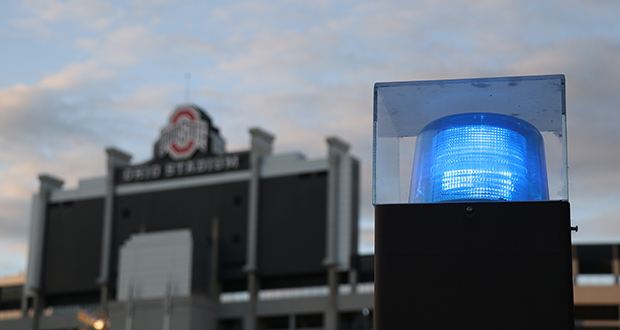
Richard Strauss in his Ohio State College of Medicine photograph. A federal court unsealed testimony Tuesday from university employees that detail administrators’ knowledge of Strauss’s abuse. Credit: Courtesy of Ohio State
The U.S. Southern District Court of Ohio unsealed an amended complaint against Ohio State that included sworn testimony by university employees during the time that former physician Richard Strauss was abusing students and student-athletes.
The complaint, originally filed May 27, includes testimony from several university employees — including doctors and Student Health Center staff — that indicates many university administrators were aware of Strauss’s abuse.
The release of the unsealed complaint comes after the university requested for testimony from employees and other witnesses not in the original Perkins Coie LLP report — which found that Strauss sexually abused at least 177 students and student-athletes during his tenure and that Ohio State failed to act in May 2019 — to be redacted. Stephen Estey, an attorney representing 93 Strauss victims in the lawsuit, said he thought the court’s decision to unseal the complaint was an important step in moving forward with litigation.
“We’re very pleased with the court’s ruling because what OSU wanted was to be the opposite of transparent,” Estey said.
University spokesperson Chris Davey said in an email that today’s Ohio State has more protections in place.
“Ohio State is a fundamentally different university today and over the past 20 years, has committed substantial resources to prevent and address sexual misconduct. These actions include new policies, programs, staffing and tools throughout the university, including athletics and the medical center,” Davey said.
Strauss was the team doctor for 17 varsity sports and a physician at the university’s Student Wellness Center from 1978-98. The university reached a $40.9 million settlement with victims in 12 of 23 Strauss-related lawsuits against Ohio State in early May.
Strauss died by suicide in 2005.
Dr. Ted Grace, the student health director from 1992-96, testified that he was aware of rumors regarding Strauss’s abuse before he was employed by the university. But the complaint says that Grace did not further investigate those rumors and that he testified that he had “no knowledge of the complaints” against Strauss.
“Dr. Grace testified that he did not look into the ‘rumor’ he heard about an OSU doctor sexually touching athletes: ‘that’s not the type of person I am. I just don’t engage,’” the complaint reads.
Gov. Mike DeWine’s Working Group on Reviewing of the Medical Board’s Handling of the Investigation found in August 2019 that no university employees reported Strauss’s misconduct to the Ohio State Medical Board. Despite Ohio State’s failure to report Strauss’ actions to the state medical board, the board opened an investigation in which Grace was interviewed and said that Strauss abused many male athletes, the complaint reads. But Grace testified that he meant “three, four, five, six. Whatever.”
When asked what word Grace would use to describe Ohio State’s decision to keep Strauss despite 20 years of abuse, Grace said it was “unfortunate,” according to the complaint.
In 1995 — one year before Strauss was placed on administrative leave and the first Student Affairs investigation began in 1996 — Strauss received “excellent” and “exceptional” ratings on a performance evaluation from his supervisors, and Grace testfied it was “the policy in student health that you would not mention a serious allegation, such as sexual misconduct, in an evaluation form.”
Grace could not be reached for comment by the time of publication.
Dr. John Lombardo, former head team physician and medical director of the Ohio State sports medicine and family health center, testified that Dr. Bob Murphy, the head team physician and director of sports medicine at Ohio State that appointed Strauss as team physician in 1981, knew of complaints since at least 1989 that Strauss showered with athletes at Larkins Hall — the recreation and athletic building since replaced by the RPAC — and that it made athletes uncomfortable, according to the report.
According to the complaint, Lombardo testified that in 1992 or 1993, Murphy told him to “take care of” reports that Strauss was showering in communal showers with at least eight student-athletes. At that time, Murphy was Strauss’s supervisor; Lombardo was not.
Lombardo could not be reached for comment by the time of publication. Murphy died in 2003.
The unsealed amended lawsuit can be read here.


